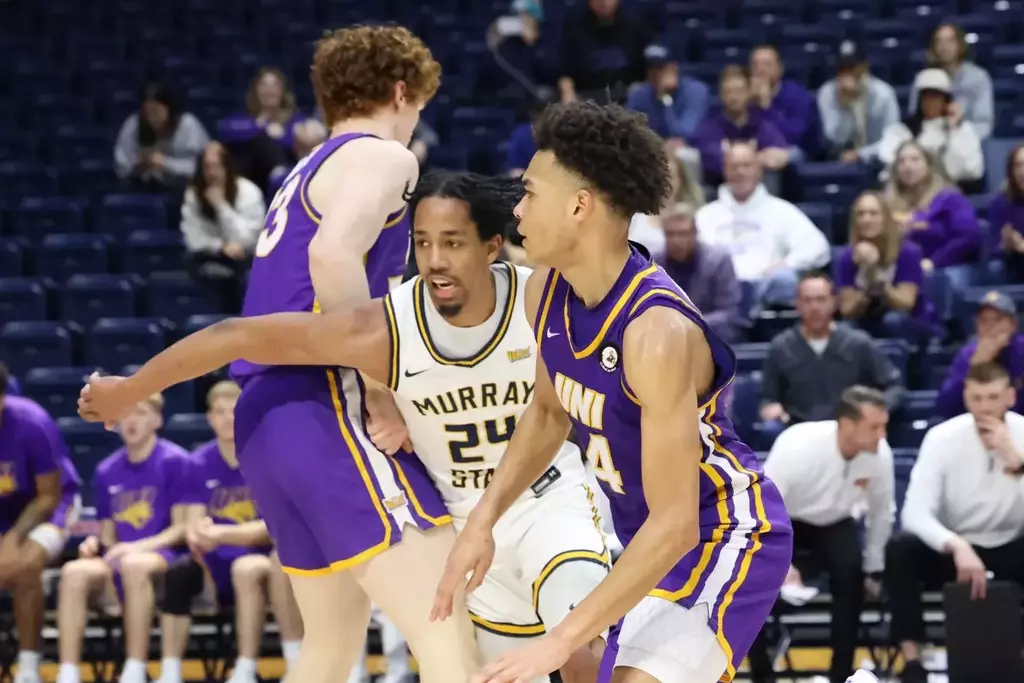For 14 years, Doug Schwab has been the driving force behind the University of Northern Iowa wrestling program, shaping it into a powerhouse of excellence on the mat and a model of integrity and discipline of it. Coach Schwab’s career has been defined by his dedication to his athletes, his unwavering commitment to growth and his ability to inspire mental toughness. His impact extends beyond the wrestling room, and he prepares his athletes for the challenges they are going to face both in the sport and in life.
Schwab’s background as a collegiate wrestler and his experience on the international stage, including competing in the Olympics, have significantly shaped his coaching approach. When discussing how his wrestling journey has influenced his coaching philosophy, Schwab
emphasized the values of discipline, resilience and adaptability.
“Learning that you have to stick with your long-term visions and goals,” Schwab said, “because things aren’t always going to be easy.”
After achieving the distinction of being a three-time all-American and winning a national championship at the University of Iowa, Schwab sought further challenges and went on to compete in the Olympics, where he proudly earned a bronze medal for the United States.
During the interview, he reflected on his long-term goals and stated how he was on the freestyle circuit for six years before he made an Olympic team. Showing that all you need sometimes is to trust and believe in yourself. “I think that sometimes you are going to reach some mountain tops, and you won’t get to stay there very long,” he stated, “enjoy the view when you do get there, but then go chase the next mountain.” That is the main lesson that Schwab has learned from this sport, and is something he tries to implement in his everyday life and his coaching.
By getting his athletes bought into the process of trusting themselves, he is helping them grow and become better people. Schwab’s leadership style revolves around mentoring athletes and pushing them to grow ss wrestlers and individuals. “You step out there (the wrestling mat) by yourself, in life, you’re going to step out there by yourself.” Schwab tries to parallel those things and believes that how you get great at anything and how you trust yourself is by putting in some work and putting yourself under stress. His main approach is to always play the long game, Schwab said “Ultimately I didn’t get what I wanted in this sport, and I don’t think anyone leaves with everything they want.” This mindset underlines the importance of consistent growth, even when the desired outcome isn’t fully achieved.

Many wrestlers experience burnout when transitioning from high school to college, they struggle to balance discipline and motivation. The demands of college-level wrestling, combined with heightened training intensity and more challenging coursework. It can make it difficult for athletes to stay focused while maintaining their passion for the sport. Schwab does an excellent job of keeping his athletes motivated on the mat. He emphasizes that “if you are progressing, if you feel like you’re getting better and improving, motivation should stay consistent.” Schwab’s approach encourages accountability without losing sight of the joy that comes from wrestling.
Schwab’s emphasis on the importance of mental toughness and discipline, draws not only from his experience coaching but also from his journey through the sport of wrestling. His leadership isn’t solely focused on producing wins on the mat. As he puts it, “If it’s based only on your wins or losses, only on your record, then your motivation comes and goes.” Instead, Schwab encourages his wrestlers to be fully invested in the sport, to stay curious and to find a genuine love for wrestling. He stresses the importance of looking beyond the outcome of matches to recognize the lessons within each match regardless of them. It all comes down to trusting and believing in yourself, staying in control, focusing on your long-term goals and being open to constructive criticism from others.
Mental toughness is a cornerstone of Schwab’s coaching philosophy, and his career provides numerous examples of the value of perseverance. Reflecting on a particularly challenging moment, Schwab shared “I’ve had a lot of losses, had a lot of wins, but going back to my high school …” He pointed back to his high school career, noting that he only won one state title. As a freshman, he finished second at state. In his sophomore year, a shoulder injury prevented him from competing. He recalled how difficult it was to sit in the stands and watch kids he knew he could beat competing and winning. His junior year was marked by further adversity, he unknowingly continued wrestling with a torn shoulder, worsening the injury throughout the season. In the finals, he lost in the last 15 seconds. Finally, during his senior year, Schwab secured a state championship.
This journey of setbacks and triumphs not only shaped Schwab into a strong competitor, but also instilled in him the belief that to overcome adversity, you need to trust in yourself. He often shares these experiences with his athletes and emphasizes that the lessons learned from failure are just as important as those gained from a victory. Schwab translates these lessons into teachable moments for his athletes, encouraging them to embrace the mental challenges that come with high-level competition. Reassuring his athletes that a match isn’t won or lost before they step on the mat. He believes that mental toughness is developed when you are put into a challenging situation, and it is this toughness that empowers his athletes to push through their struggles, both on and off the mat.
Another example in Schwab’s life where his persistence is shown as victorious is right after he graduated high school, “I didn’t feel like I was highly recruited coming out of high school.” Schwab only won one state title. When he was at Iowa, he competed as a freshman and wasn’t a stand-out. However, the next year, he won a National Title. Schwab reminds his athletes that it is about mental preparation, having positive self-talk, and knowing that regardless of the outcome, you leave everything out on the mat.
Wrestling has profoundly influenced Schwab’s life beyond the mat, creating personal growth, mental toughness, and discipline. It instilled in him a strong work ethic and a deep understanding of accountability. When asked about the impact of wrestling on his life off the mat, he quickly addressed the choices he has made, particularly his decision to abstain from alcohol. “I don’t drink,” he emphasized. “It was a conscious decision, wrestling was more important to me.”
Schwab reflected on his long-term goals, acknowledging that some influences are not beneficial and recognizing how individuals manage their relationship with alcohol. He believes that having a clear vision of your goals should guide your choices. Returning to the lessons from his parents, he remarked, “How do I treat people? There’s a certain way to treat others –– with respect and a strong work ethic.” This shows Schwab’s commitment to self-improvement, as he consciously avoids behaviors that could jeopardize his relationships and overall well-being.
When asked what advice he would offer to young wrestlers, Schwab highlighted the importance of having a clear vision and staying patient. He advises young athletes to dream big but remain grounded, to realize that success doesn’t come instantly. Schwab believes that persistence and mental toughness are keys to excelling both in wrestling and life. By staying committed to the process and not focusing solely on immediate results, athletes can build the mental toughness required for long-term growth. Schwab emphasized that it’s not just about wins or losses but how you handle the challenges along the way. He says, “If there is a lesson in those losses, and you realize it, then I feel like you can grow from it.”
As Doug Schwab reflects on his time at UNI, his thoughts aren’t focused on defining his legacy. “That’s not something that you get to decide,” Schwab says. “ It’s the way you treat people every day, and if you come in and do the right things over and over again, that will eventually become your legacy.” He doesn’t want to be remembered solely for his achievements as a national champion, Olympian, or even for the number of duals he has won. “If my credentials are the first thing people remember about me, then I didn’t do it right.”
Schwab’s belief in trusting the process and staying committed to your visions extends far beyond the mat. He encourages his athletes to embrace hard work, trust their efforts, and stay patient with their development. “Don’t be afraid to do the work and trust the work because that’s where the growth is,” he says. These words explain the essence of Schwab’s approach to life, wrestling, and leadership. An endless pursuit of improvement, discipline, mental toughness, and self-belief.
For Schwab, legacy isn’t about titles or accolades: It’s about leaving a lasting impact on the lives of his athletes and the people around him. His advice to them, and anyone seeking success is, “With anything, you’ve just got to get started. When you’re steady with things and you do it consistently over time, you will improve.”
As his coaching career continues to evolve, Doug Schwab’s influence will resonate in the lives of his wrestlers, teaching them not only how to win but, more importantly, how to navigate the challenges that life will throw at them. And for Schwab, that is a legacy worth leaving.





















David Damstra • Oct 29, 2024 at 6:23 pm
What a blessing Coach Schwab and his staff is to these young men!
Dave Damstra • Oct 28, 2024 at 5:33 pm
What a blessing Coach Schwab and his staff is to these young men.